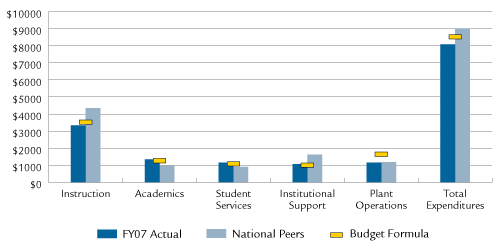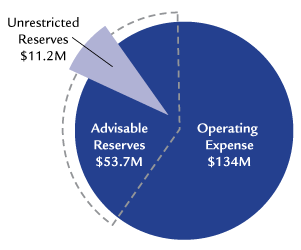Bridgewater State College
Bridgewater State College (BSC), the comprehensive state college of Southeastern Massachusetts, is committed to providing quality teaching and learning opportunities to the residents of Southeastern Massachusetts and the Commonwealth and to using its intellectual, scientific, and technological resources to support and advance the economic and cultural life of the region and the state.
Program of Distinction
Collaborations
Access Indicators
Affordability Indicators
Student Success and Academic Quality Indicators
Fiscal Effectiveness and Efficiency Indicators
Program of Distinction
The college developed an innovative mentoring partnership with Brockton Public Schools (BPS) designed to bolster at-risk students’ chances for success. Approximately 25 BPS eighth-grade students are paired annually with BSC student mentors for their four years of high school. As new students are recruited into the program, current BPS students will become their mentors along with an assigned BSC mentor. BPS students who complete the program and are accepted at BSC will be awarded a full, four-year scholarship. Having completed its inaugural year, the mentoring program has already proven to be enormously beneficial to Brockton Public Schools—the college’s largest feeder district—and the mentoring students.
Collaborations
- In a first-of-its-kind collaboration, BSC has partnered with Bristol Community College to have a permanent presence in Attleboro, historically one of the most educationally underserved regions of Eastern Massachusetts. Beginning in January 2009, more than a dozen classes will be offered in disciplines such as social work, special education, psychology, communications and criminal justice, all the while taking full advantage of the “2+2” model of public higher education.
- As part of its ambitious program to build connections with the Middle East, the college recently established an exchange agreement with Tafila Technical University (TTU) in Jordan. Graduate students from TTU are enrolled in programs at BSC, and TTU faculty are teaching highly sought after Arabic language classes at the college. Through this partnership, BSC students are being provided an important cross-cultural exchange that would otherwise not be easily attainable in the region.
- The President’s Task Force to End Homelessness positions the college to be a significant agent of positive social change throughout Southeastern Massachusetts and bolsters the ongoing regional efforts of local businesses, service providers, policy makers and community leaders. The Task Force focuses the college’s intellectual capacity in fighting the problem and mobilizes students and faculty for unique service-learning opportunities (e.g. conducting an annual homeless census in urban areas).
- Under the auspices of the college’s Office of Institutional Diversity, BSC received a $145,000 Nellie Mae grant to strengthen its pedagogies, outreach and retention programs for low-income and first-generation students, as well as students of color. In a time of extraordinary demand for a BSC education, this initiative – known as Project Compass – helps ensure the college remains true to its historic promise of accessibility.
- The college’s Division of External Affairs partnered with many economic development leaders from the region, including the Metro South Chamber and the Brockton 21st Century Corporation, to form the I-495 South Collaborative. The mission of the collaborative is to create a mutually-beneficial, thriving regional alliance that will provide internships and employment for BSC students and other residents of Southeastern Massachusetts.
- Working hand-in-hand with the City of New Bedford, and following the decision of Delta Airlines to close its academy at the Greater New Bedford Regional Airport, the college has introduced its own flight-training program that will serve over 150 aviation students annually. In addition to enhancing the program’s overall quality, establishment of the BSC flight school constitutes an important economic engine for the city and an invaluable new anchor for the airport.
- The BSC Educator Resource and Enhancement Center (EREC), in collaboration with over 200 middle school students and teachers from throughout Southeastern Massachusetts, hosts Project Invention Convention. During the academic year, dozens of student teams design and produce an invention that they demonstrate and enter into a competition for recognition at an annual convention. The development of these inventions, which have ranged from “Magnetic Snowboard Bindings” to “CNNS – Carbon Nanotube Nutrition Systems,” helps spark an affinity for math and science at a young age.
- BSC has collaborated with 40 school districts in Southeastern Massachusetts to create the Curriculum Leadership Center (CLC). The CLC provides professional development opportunities for educators in the area by exposure to nationally known speakers, discussions of current issues and trends, and collaboration with other educational leaders to solve problems. In addition, the CLC encourages teacher leadership through the Innovative Curriculum Grant program that awards funds to teachers for the development and implementation of unique curriculum concepts.
Section I: Access to Public Higher Education in Massachusetts
Access Indicators
Fall 2007 Enrollment
| Undergraduate Headcount |
8,160 |
| Undergraduate FTE |
6,986 |
| Graduate Headcount |
1,774 |
| Graduate FTE |
776 |
Fall Enrollment
Over the last three years, fall headcount enrollment has increased 4.1%.
Over the last three years, fall full-time equivalent (FTE) enrollment has increased 5.2%.
Annual 2007–2008 Enrollment
| Undergraduate Headcount |
9,388 |
| Undergraduate FTE |
7,084 |
| Graduate Headcount |
2,917 |
| Graduate FTE |
1,148 |
Annual Enrollment
Over the last three years, annual headcount enrollment has increased 4.2%.
Over the last three years, annual FTE enrollment has increased 7.0%.
Looking Back: Undergraduate and Graduate Fall Headcount Enrollment

Fall 2007 Minority Enrollment
11.3%
Minority Enrollment
Greater than the Southeast Region's minority representation of 9.1%.
Fall 2007 Community College Transfer Students
409
Community College Transfer Students
Over the last three years, the number of community college transfer students has remained relatively stable.
Section II: Affordability of Massachusetts Community Colleges
Affordability Indicator
2007–2008 Tuition and Fees as a Percent of Median Family Income
7.7%
% of Median Family Income
Below the Northeast regional average of 9.1%.
Looking Back: Tuition and Fees as a Percent of Median Family Income
|
FY2004 |
FY2005 |
FY2006 |
FY2007 |
FY2008 |
| Bridgewater State College Tuition and Fees |
$4,390 |
$5,326 |
$5,506 |
$5,866 |
$6,034 |
| State Median Family Income |
$67,527 |
$68,701 |
$71,655 |
$74,463 |
$78,497 |
| "X" as a Percent of State Median Family Income |
| X = Bridgewater State College Tuition and Fees |
6.5% |
7.8% |
7.7% |
7.9% |
7.7% |
| X = Massachusetts State Colleges' Average Tuition and Fees |
6.7% |
7.3% |
7.5% |
7.8% |
7.7% |
| X = Northeast Average Tuition and Fees |
|
9.2% |
9.3% |
9.3% |
9.1% |
Section III: Student Success and Academic Quality
Success and Quality Indicators
Fall 2006 Cohort First-Year Retention Rate
74.3%
Fall Cohort First-Year Persistence
Comparable to the segmental rate of 74.4% and the national rate of 73.6% but below the institutional peer retention rate of 77.0%.
Looking Back: Fall-to-Fall Retention Rate
|
Cohort |
|
Entering 2002 |
Entering 2003 |
Entering 2004 |
Entering 2005 |
Entering 2006 |
| Bridgewater State College Rate |
77.3% |
77.8% |
75.7% |
75.0% |
74.3% |
| Peer Rate |
|
78.1% |
77.8% |
76.6% |
77.0% |
| Massachusetts State Colleges Segment Rate |
74.6% |
75.2% |
76.2% |
73.5% |
74.4% |
| National Average |
|
74.3% |
74.0% |
73.7% |
73.6% |
1999–2001 Cohort Six-Year Graduation Rate (3-Year Average)
48.8%
Six-Year Graduation Rate
Comparable to the segmental rate of 47.3% but below the institutional peer rate of 52.4%.
Looking Back: Six-Year Graduation Rate
|
Cohort |
|
|
Entering 1998
Grad. by 2004 |
Entering 1999
Grad. by 2005 |
Entering 2000
Grad. by 2006 |
Entering 2001
Grad. by 2007 |
Rolling Average Entering 1999– 2001 |
| Bridgewater State College Rate |
51.4% |
47.8% |
50.6% |
47.9% |
48.8% |
| Peer Rate |
51.5% |
51.4% |
52.7% |
53.0% |
52.4% |
| Massachusetts State Colleges Segment Rate |
47.6% |
47.2% |
48.9% |
45.9% |
47.3% |
Total Degrees Conferred in FY2008
2,004
Degrees Conferred
Average degrees conferred per year over the last three years: 1,950
Looking Back: Degrees Conferred

2007 Pass Rate on the Massachusetts Test for Educator Licensure
95%
Number of Students Passing MTEL
339
Massachusetts Test for Educator Licensure Pass Rate
Above the Board of Higher Education's target pass rate of 80%.
Percent of New Students Who Were Special Admits in Fall 2007
6.5%
Special Admissions Students
Meets the Board of Higher Education requirement of enrolling less than 10% special admissions students per year. (See Appendix.)
Section IV: Effective and Efficient Use of Resources
Effectiveness and Efficiency Indicators
Effective Projects and Initiatives
- Funded $2.1 in Library renovations with local funds, completing a 4 year renovation to Library.
- Completed a comprehensive energy and water conservation program. The results yielding a 27% reduction in energy use campus-wide.
- Replaced life and safety equipment ($1.2 M) in Tillinghast Hall and Kelly Gym.
- Re-bid insurance policies, saving $20,000 in insurance premium costs.
Resource Allocation
Expenditures per Student—Actual, National Peers, and Budget Formula

Note: This graphic was revised on May 6, 2009. The previously posted graphic displayed the data inaccurately.
FY2008 Primary Reserve Ratio
| Unrestricted Reserves (UR) |
$11,170,935 |
| Total Operating Expenses (TOE) |
$134,206,734 |
| Primary Reserve Ratio (UR/TOE) |
8.3% |
Primary Reserve Ratio

Compliance
No materials weaknesses based on annual external independent audit:

